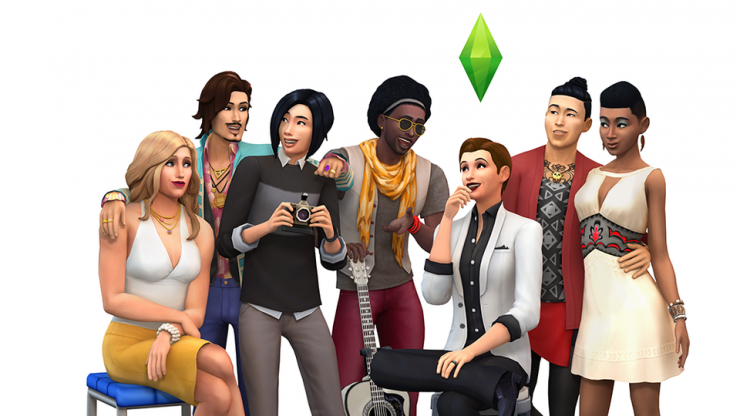Growing up, I never would have used the word gamer to describe myself. Even though I spent a lot of time playing online games, I still didn’t feel like I had earned the title. I was mainly playing The Sims, a game I would never dare to claim aloud as gaming (even though looking back now I can say it definitely qualified). When I was playing games I associated more with gaming, such as Minecraft, I still felt like I wasn’t playing them well enough or in the right way.

So why wouldn’t I call myself a gamer? Isn’t playing games online the only requirement for gaming? I think the reason lies in how the label gamer has been heavily associated with the masculine. It could be difficult to claim to be a gamer as a girl, and in my experience it was often followed with an expectation to prove you were a real gamer. And not all computer games were considered the right ones. Games centered around action or violence were praised, whereas games like The Sims and Moviestarplanet were often dismissed. This separation of REAL gamer games reflects a much older pattern of gendered play.

Since the 1940s children’s toys have been marketed separately for young girls and boys, a way where manufacturers could sell even more toys. Through the gendered toys society gender norms are reflected and reinforced. Something I really enjoy in the English language, which my own mother tongue (Danish) lacks, is the distinction between sex and gender. According to Judith Butler, gender is a created social structure. Gender is something we do, it is a performance for society, consisting of actions that we associate with a gender. This is seen in the choice of clothes, the way we move and our interests. It is something we as a society impose on ourselves and it starts in early childhood. Very generally speaking girls are given toys like dolls and expected to play house, whereas boys are given more action based toys and expected to play wildly.

But why is there a tendency to associate these boy games with real gaming?
In my opinion the answer lies in the patriarchy’s tendency to value traits linked to masculinity higher than the equivalent feminine traits. We praise qualities as strength, courage and leadership, and we link them to the gender of men. While care, collaboration and empathy are considered weaker, which are often linked to the feminine. This difference in value is also present in our gender performance. When girls/women adopt, what we consider, more masculine qualities, they might be outside of the norm, but it is generally tolerated within society. But on the other side if boys/men express more feminine traits they are often ridiculed. We are becoming more open minded about gender norms, and how gender is not binary, but for example wearing a skirt or nail polish as a man can be met with strong reactions. These reactions especially directed towards feminine presenting men, is because as a man taking on feminine traits devalues you, since within society the feminine is considered of less worth.

Gender norms and gendered play has transferred into the world of digital games. Games about combat, strategy and conquest, traits I argue are associated with the masculine, are therefore perceived as more serious and thereby considered real gaming. Games centered around housebuilding, care and emotion are dismissed. I do think a lot has changed since I was in my prime teenage years, in 2016, but I still see the tendency online.
Looking back I think my hesitation surrounding the label gamer reflected a much bigger problem than my own teenage insecurities. The digital world reflects the rest of society including our view of gender. This is why we need to keep reflecting critically on our basic understanding of our set standards. Because when we dismiss gamer girls or only accept when they take on more masculine qualities, we are not just gatekeeping gaming but reinforcing gender norms. Even though I am not a frequent player of online games anymore, maybe the change starts with claiming the word gamer to describe my younger self. 🙂
Sources:
Megan Maas, “How toys became gendered”, December 2019; https://msutoday.msu.edu/news/2019/12/how-toys-became-gendered
Judith Butler, “Performative Acts and Gender Constitution,” in The Performance Studies Reader. New York and London: Routledge, 2014.
Pictures:



I wasn’t a gamer before, but I found your blog really interesting. I never thought about it in such depth until I realized that the majority of gamers are male rather than female. Considering how social norms suggest that men should be more masculine while women should act more feminine, I feel that in the 21st century, we shouldn’t cling to these stereotypes about what people should enjoy. It’s better to let people do what feels right for them, and I think society is slowly getting better in this regard. Overall, I think your post gives a really good insight.
I think that competing, whether you win or lose, is also related to masculinity. I remember that the fastest runner was the most popular with the girls at primary school. It is interesting and scary at the same time, how our interests and preferences are shaped by society. I may be wrong, but I assumed that gamer girls would be special and popular in the online game world, because it’s unexpected. I also think it’s because the gaming world tends to value masculine traits more highly than feminine ones, as you wrote.
This is a blog that stood out for me because I often find myself in this debate with people. There seems to be this association between gaming and competition and if you are not competing then it does not count. I’ve spoken to people about the game 2k and they’ve claimed I”m not ‘really’ a 2k player becuase I don’t play against other people online and only focus on the role-playing aspect of the game. So despite playing the exact same game, the way I play it means I’m not a gamer. This fickle understanding of what it means to be a gamer is a such an interesting concept, one which your blog perfectly encapsulated.
This is a remarkable blog. You have analyzed the subtle gender politics within gaming culture, revealing the power structures hidden behind the “gamer” identity. Traditional “male-oriented” games, centered around action and violence, are often celebrated as the hardcore standard, while “female-oriented” games, focused on simulation, social interaction, and emotion, are marginalized as “not real games.” This is essentially an extension of patriarchal values into the digital realm, where society consistently privileges masculine traits over feminine ones and grants the former greater cultural legitimacy.This distinction is not natural but is constructed and reinforced through social performance, starting from the gender-specific marketing of children’s toys,what we commonly refer to as “masculinity” and “femininity.” When female players feel compelled to prove themselves by mastering “male games,” or when their interests are dismissed condescendingly, the gaming community unwittingly becomes complicit in reinforcing gender norms.Knowing the legitimacy of all gaming experiences is not only the starting point for equality in gaming but also a key to loosening rigid gender hierarchies. Maybe only when The Sims receives the same respect as Call of Duty can virtual worlds truly become spaces of freedom.